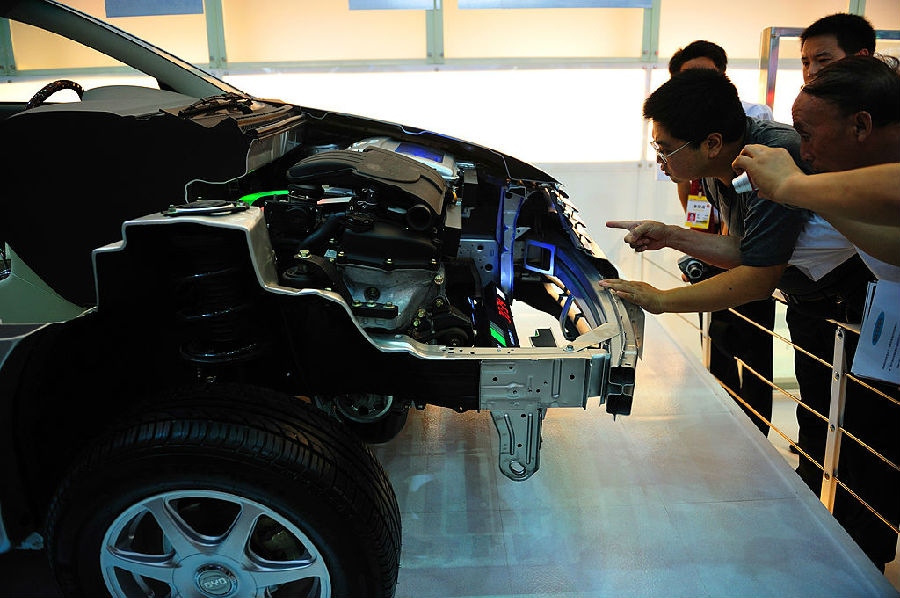(单词翻译:单击)
A growing movement to eventually ban combustion engine cars has received a boost with a statement from China — the world’s largest car market — that it is studying such a move.
拥有世界最大汽车市场的中国表示,正在研究最终禁止内燃发动机汽车,从而使这股不断发展的全球趋势得到一个提振。
Comments by a senior government official published on Sunday signalled that China might soon join the UK and France. Both countries recently announced they would prohibit the production of diesel and petrol cars by 2040.
周日见报的一名政府高官的言论表明,中国可能很快加入英国和法国的行列。英法最近宣布到2040年将禁止生产柴油和汽油发动机汽车。
“Some countries have made a timeline for when to stop the production and sales of traditional fuel cars,” said industry vice-minister Xin Guobin in an article published by Xinhua, China’s official news agency.
“一些国家已经制订了停止生产销售传统能源汽车的时间表,”在官方的新华社发表的一篇文章中,中国工信部副部长辛国斌表示。
“The ministry has also started relevant research and will make such a timeline with relevant departments. Those measures will certainly bring profound changes for our car industry’s development,” he said, predicting “turbulent” times ahead for the auto industry.
“目前工信部也启动了相关研究,也将会同相关部门制订我国的时间表,这些举措必将推动我国汽车产业发展的环境和动力发生深刻变化,”他表示。他预测,汽车产业将迎来变革“剧烈的”时期。
Were China to adopt such a policy and provide a deadline, it would lend new force to efforts to end the reign of the internal combustion engine.
如果中国真的实行这样的政策,制定最后期限,那将极大地推动有关终结内燃发动机霸主地位的努力。
China has the world’s largest automobile manufacturing base — producing 28m vehicles overall in 2016, according to the International Organization of Motor Vehicle Manufacturers. The figure includes commercial vehicles as well as cars and represents nearly 30 per cent of the world total of 94m last year.
国际汽车制造商协会(OICA)的资料显示,中国拥有世界上最大的汽车制造基地,2016年总产量达到2800万辆。该数字包括商用车和轿车,占去年全球9400万辆总产量的近30%。
Beijing is concerned about rising urban pollution, climate change and China’s dependence on imported foreign oil supplies, and has been encouraging the nascent new energy vehicle (NEV) industry with measures such as subsidies and easier access to car registration for NEV buyers.
北京方面担忧越来越严重的城市污染、气候变化以及中国对进口石油的依赖程度,并且在借助补贴和让新能源汽车更容易上牌等措施,鼓励新能源汽车行业的发展。
The government also sees the advent of electric vehicles as a way to leapfrog global carmakers and secure a larger chunk of the car business for Chinese carmakers, which have never been particularly strong at making combustion engines. With 507,000 NEVs sold domestically in 2016, China leads the world as an electric vehicle market.
中国政府还认为,电动汽车的问世是一个机会,可以使中国汽车制造商实现跳跃式发展,超越全球汽车制造商,并争取到更多汽车业务。中国厂商在制造内燃发动机方面从未特别擅长。2016年,中国国内新能源汽车销量达50.7万辆,使中国成为世界最大的电动汽车市场。

NEVs were recently identified as a priority by the Chinese industrial policy known as Made in China 2025, and the sector is one of 10 high-tech industries in which China wants to create national champions that will be globally competitive.
新能源汽车最近被列为中国产业政策《中国制造2025》(Made in China 2025)的一个重点,该行业是中国想要缔造具有全球竞争力的国家冠军企业的十大高新技术产业之一。
China surpassed the US in 2009 to become the world’s biggest car market and has set the ambitious goal of reaching 7m annual NEV sales by 2025. Buoyed by generous subsidies and meteoric sales, more than 200 companies have announced their intention to make and sell NEVs in China.
中国在2009年超过美国,成为世界最大汽车市场,并已制定了到2025年让新能源汽车年度销量达到700万辆这一雄心勃勃的目标。在慷慨补贴和销售火爆的激励下,已有200多家公司宣布有意在中国制造和销售新能源汽车。
China’s government is also setting up a policy of carbon trading that will encourage NEV production, to be implemented as early as next year. This will require all carmakers to produce a quota of NEVs or buy carbon credits to compensate. Draft rules, part of an effort to jump-start the local production of electric vehicles, have been circulating but have yet to become law.
中国政府还正在制定鼓励新能源汽车生产的碳交易政策,最快在明年就能实施。它将要求所有汽车制造商都生产一定配额的新能源汽车,或者购买碳排放额度作为补偿。作为推动电动车本土生产的努力的一部分,相关规则草案已经流传了一段时间,但尚未成为法律。
Late last month, Reuters reported that China was likely to delay implementing these production quotas for electric vehicles, giving global automakers more time to prepare.
上月下旬,路透社(Reuters)曾报道称,中国很可能推迟实施电动汽车生产配额制度,让跨国汽车制造商有更多时间准备。


